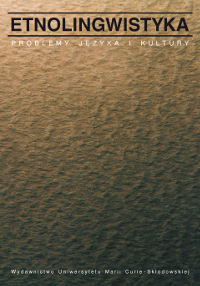Tak zwana gramatyka kognitywna a problem stereotypu
COGNITIVE GRAMMAR AND THE PROBLEM OF STEREOTYPE
Author(s): Henryk KardelaSubject(s): Language and Literature Studies, Theoretical Linguistics, Applied Linguistics
Published by: Wydawnictwo Naukowe Uniwersytetu Marii Curie-Sklodowskiej
Keywords: metaphorization; similes; cognitive grammar; stereotype vs prototype
Summary/Abstract: The paper discusses the problem of a stereotype against the background of the so-called Cognitive Grammar as proposed and developed by R. Langacker, G. Lakoff and others. After a short presentation of the main assumptions of the Cognitive Grammar an analysis of comparisons involving stereotypes is attempted. It is claimed that the mechanism underlying comparisons and, indeed, all metaphorical uses of language, involves a departure of a word, sentence or a phrase from the centre of a prototype; it is on the periphery of the prototype that metaphors are created. A great deal of light, it seems, can be shed on metaphorization processes if a diachronic aspect of stereotype formation is taken into account. In the case at hand, three stereotypes of ’ghost’, ’devil’ and ’horse’ functioning in Polish folk texts have been examined. A hypothesis has been put forward that the farther on the scale of the prototype a given stereotype has moved during the process of historical change, the greater should be the number of elements compared with which it can appear. In other words, movement to the "periphery” allows a considerable relaxation of selectional restrictions and other conditions on well formedness. This is why it is possible to say in Polish: I have a devilish headache (a strong headache) but not: I have a horse-like headache (i.e. a strong headache). In the former case the stereotype of the devil has undergone far greater changes in its historical development than the stereotype of the horse, or, to put it differently: the former is more peripheral on the prototype scale than the latter.
Journal: Etnolingwistyka. Problemy Języka I Kultury
- Issue Year: 1/1988
- Issue No: 1
- Page Range: 35-46
- Page Count: 12
- Language: Polish

